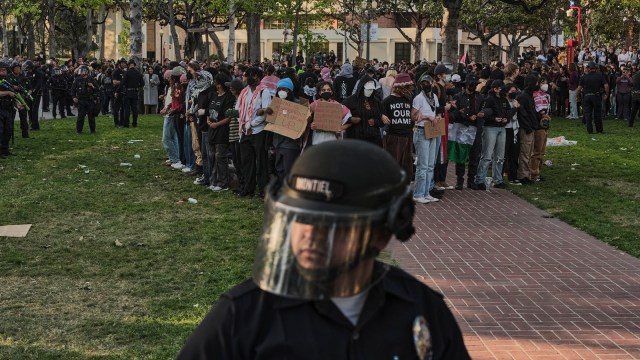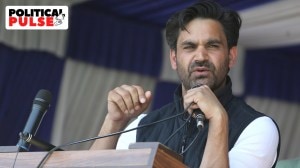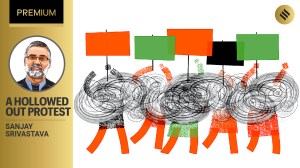- India
- International
First Covid-19, now Israel-Hamas war: How students in US colleges have been denied a second chance at senior year
With graduation less than a month away at Cal State Humboldt, a campus closure and student protests have triggered a wave of memories in some students.
 Police and pro-Palestinian protesters at University of Southern California in Los Angeles, April 24, 2024. Millions of high schoolers had their senior years upended in 2020 by the Covid pandemic. Four years later, some of those same students’ college senior year traditions have also been disrupted — this time by protests of Israel’s actions in Gaza and attempts to contain the demonstrations. (Photo: The New York Times)
Police and pro-Palestinian protesters at University of Southern California in Los Angeles, April 24, 2024. Millions of high schoolers had their senior years upended in 2020 by the Covid pandemic. Four years later, some of those same students’ college senior year traditions have also been disrupted — this time by protests of Israel’s actions in Gaza and attempts to contain the demonstrations. (Photo: The New York Times)Written by Callie Holtermann, Sandra E. Garcia and Frank Rojas
Divya Jakatdar imagined that she would spend her senior year of high school celebrating college acceptances with her friends, attending prom and walking across the stage at graduation to the cheers of her family members.
Instead, her senior spring arrived at the same time as the coronavirus pandemic. She said goodbye to high school classmates over Zoom; her graduation was a drive-thru.
Jakatdar, 21, thought her senior year at the University of Southern California might be a kind of do-over. But it has erupted into unrest in recent weeks after the school canceled commencement speeches by its valedictorian, Asna Tabassum, film director Jon M. Chu and tennis star Billie Jean King, citing safety concerns related to the Israel-Hamas war, and then went a step further Thursday, canceling the university’s “main stage” commencement ceremony entirely.
“It’s a very big hit to morale for the exact class that felt like they lost their high school graduation,” Jakatdar, the student body president of USC, said a few minutes after getting news that the commencement was off. “We’ve missed out on enough.”

But as was the case during COVID-19, Jakatdar does not feel quite right about moping. “It seems sort of ridiculous for us to complain about graduation when people’s lives are on the line,” she said.
It is a story that is playing out across the country. Millions of high schoolers had their senior years upended by COVID in 2020, being left to celebrate their momentous occasion in isolation. Four years later, many of those same students have had the traditions of their senior years foiled once again, this time in response to the Israel-Hamas war and the attempts by universities to shut down or contain widespread protests.
At Columbia University in New York City, the university president called police to clear an encampment of pro-Palestinian demonstrators, resulting in the arrests of more than 100 protesters. Classes were moved online for the remainder of the spring semester. At USC, students protested for days, calling on the administration to reinstate Tabassum as speaker. The wave of student activism extends to pro-Palestinian protests at schools including Yale University, the University of Michigan, the University of Texas at Austin and the Massachusetts Institute of Technology.
Maideh Orangi, 22, a senior at USC and an executive director of its Middle Eastern North African Student Assembly, has spent much of her year organizing demonstrations and vigils for the Palestinians killed in the Gaza Strip since Israel’s invasion.
“I expected it to be more typical senior year things,” Orangi said. “But I’m not upset that this has been a defining aspect of my senior year.”
Orangi said she and other students were shocked when the university commencement ceremony was canceled. “The one glimmer of hope, the one bright side that I was looking forward to in all of this was that one commencement, and now it’s just all gone,” she said. “It feels like the whole end to my senior year is surrounded by a really sour feeling.”
For Rachel Burns, a senior at Barnard College, a proper graduation has been a long time coming. When she graduated from high school four years ago, in Portland, Maine, she did so from her car in the school parking lot. This time around, her only plan is to make sure that her demands and her fellow protesters’ are met by Columbia University.
“I think that what’s most important right now is that we stick together and put up a united front against the administration, and if that means sacrificing my graduation, then I’m willing to do that,” Burns, 24, said while wearing a kaffiyeh around her head and dark sunglasses in front of Butler Library.
Not every student feels that way. Ruby Cayenne, 23, a senior at California State Polytechnic University, Humboldt, in Arcata, California, said she was heartbroken by the prospect that protests might disrupt her graduation.
“I have put my blood, sweat and tears into getting this degree,” she said. “The family on my father’s side are Cuban immigrants, and they fought hard to get into this country and to provide a life where their future generations can get an education.”
Cayenne, who is Jewish and identifies as a Zionist, said she had felt personally harassed by individuals from the Humboldt for Palestine group.
“They sought me out. They called me a genocide supporter, a baby killer, a fascist,” Cayenne said. “They don’t know me; they don’t know what I support. So to know that those people are potentially going to take away my opportunity to experience my hard-earned graduation is a horrible feeling.”
The emotions range widely among other affected students.
Neeve Levy, 24, who started at Columbia in 2020 after a couple of gap years, was crushed when she realized classes would be remote because of the pandemic. Now a senior, she said she understands the protesters and struggles with not protesting herself but sees how polarizing the topic has been.
“I have a lot of respect for the protesters and what the students are doing,” Levy said from Butler library. “I struggle with seeing how it’s affecting many of my Jewish friends.”
Levy’s grandparents live in Israel and have been excited to see their granddaughter graduate, but now that might not happen.
“At the beginning there were questions of whether or not they could make it because of airlines canceling after Iran bombed Israel,” she said. “It’s crazy to me, the fact that I’m actually graduating from here — or that I even got here — and the thing that’s stopping it is not me.”
Sofia Ongele, 24, was also not part of the 2020 pandemic class of high schoolers, but her senior year wasn’t exactly what she expected. Her small charter school in Santa Clarita, California, closed around the time of her graduation, so the ceremony was small and disappointing, and a gap year was spent at home.
Now a senior at Columbia, her spring is being dominated by world events of a different kind. Speaking from inside the protest encampment on the south field of Columbia University’s upper Manhattan campus, she said she couldn’t think of a better way to spend the last few weeks of her college years than taking part in a protest with her fellow classmates.
“Unfortunately, being Gen Z means dealing with repeated states of the world that are in absolute hostility and turmoil,” Ongele said while standing at a community guidelines board in front of the encampment, wearing a black face mask. “We are the generation of school shootings, the generation that is tasked to deal with climate change. We’ve just been dealt the short end of the stick time and time again.”
With graduation less than a month away at Cal State Humboldt, a campus closure and student protests have triggered a wave of memories in some students.
Jacqueline V. Espinoza, 21, a senior at Humboldt, said it was around this time four years ago that she last experienced this kind of intersection of personal and global history.
“It was a surreal moment when I think of the class of 2020,” said Espinoza, an English major. “I remember like a bunch of the BLM protests going on during that time, and now that I’m graduating in 2024, I can definitely see the parallels.”
At USC, Mustafa Ali Khan, 21, had been looking forward to his graduation, especially after transferring there following two years of community college.
“One puts a lot of weight in these moments. It’s kind of like a culmination of a lot of work you put in,” he said.
He said the decision to cancel USC’s main commencement would be especially painful for family members, many of whom had already made plans to come to campus.
“My mom’s saying she can’t wait for my grad school graduation now,” he said.
This article originally appeared in The New York Times.
May 11: Latest News
- 01
- 02
- 03
- 04
- 05





























